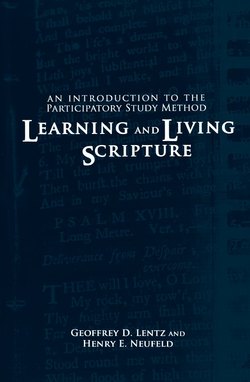Читать книгу Learning and Living Scripture - Geoffrey D Lentz - Страница 7
На сайте Литреса книга снята с продажи.
Оглавление1 Introduction
Introducing the basic principles of the Participatory Study Method
Most Christians know that studying the Bible is a crucial part of their spiritual development. Many people feel guilty for not studying the scriptures as much as they think they should. We believe this lack of study is largely due to two things. First, many people lack the basic skills, study methods, and organization required to learn scripture. Second, the Bible is a complicated book with many different types of writings that can be read and interpreted in different ways. This book is designed as a guide to help with both of these issues.
You will find a full method for reading scripture and getting the most out of it. You will find references to many study helps including commentaries, Bible dictionaries, concordances, and study editions of the Bible. It can help you find a translation that meets your study needs. The method presented in this book can help you study the Bible privately, as part of a small group, or even lead a group Bible study. This series includes study guides developed on several books of the Bible that use this method.
This book also helps to make the Bible more accessible. Different parts of the Bible must be read in different ways. For instance a Psalm is to be read and interpreted in a different way than a chapter of Mark or Revelation. This book will give you details about many types of writing in the Bible and how to get the most out of reading them.
What is participatory Bible study? Normally we call Bible study participatory when everybody in a group participates. This distinguishes it from those groups in which one person speaks and the rest simply absorb.
In the participatory study method we take that a step further. Not only do you need to personally participate in Bible study, but you need to become part of the Bible story. This may seem like a tall order. Just how can you do that?
If you have become a Christian, you are now part of the Bible story. Participatory Bible study invites you to find your place in the story and live positively according to God’s will, doing your part to carry the great drama forward. Are you going to be aware of your role in the greatest drama in history, or will you be passive and just let things happen to you?
Many Bible students get very little from their study. When they do study seriously, they are very dependent on commentators, and they’re not sure just how the interpretations are produced. Some get involved in the technical details of Bible study, but then either give up, or become bogged down in hunting down minor points, and miss much of the blessing that is available.
Our conviction is that Bible study should be about experiencing God. It is not just learning about God or learning doctrines taught by others. It is about getting a first hand experience of what God has to say to you and then living as one of God’s children.
1 The first key is to get the Bible out from between you and God. Let God speak to you. Let the Bible help. Don’t let the Bible be a barrier. The Bible is not the only way you access God. It is not necessarily God’s primary way of communicating with you personally. Rather, it provides a light on your own relationship with God. The question is this: How can I improve my relationship with God through understanding how these other writers related to God?1
2 The second key is to approach the Bible with a desire to learn, not to find support for what you already know. This seems simple, but in the church we are often so tied up with our doctrinal statements, or more likely weak memories of them, and also so afraid that our own ideas might be wrong or that someone will call them (gasp!) heresy, that we really can’t listen openly to what the Bible says. We’re not saying that the Bible is going to overturn all your traditional doctrines. We are saying that you should not worry about being wrong as you try to understand what the Bible says, and particularly what God is saying to you as you study the Bible.
3 The third key is to make a serious and active effort to understand just what it was that the people in Biblical times experienced, and how they responded to it. Get to know them as they were. It’s impossible to do this perfectly, but it is worth your effort to do your best. This means accurate and empathetic reading. It also means some humility – not assuming that you are more intelligent, wiser, more ethical, and have a better imagination than the people you’re reading about.
4 The fourth key is to look at yourself and your spiritual community carefully and honestly, and try to bring your experiences together with those of others. This is how the participation is brought forward to the present and your Bible study starts to impact who you are as a person. This is where you begin not just to learn scripture, but to live it.
5 The fifth key is to share your experiences with others, and to try to translate your understanding so that they can also understand and participate. Don’t be afraid to talk about ethical issues without reference to the Bible. If you really understand what you have learned in your Bible study and your communion with God, you should be able to support it on another basis. We believe that if God is the creator of the universe, and we have understood what God wants, it should also be rational to some degree.
